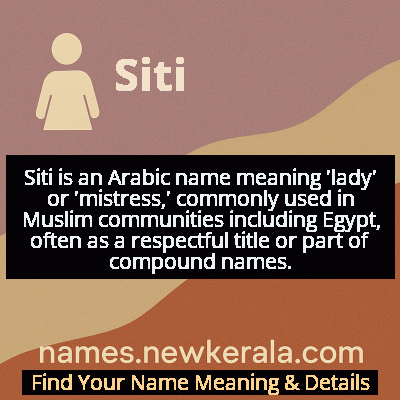Siti Name Meaning & Details
Origin, Popularity, Numerology Analysis & Name Meaning of Siti
Discover the origin, meaning, and cultural significance of the name SITI. Delve into its historical roots and explore the lasting impact it has had on communities and traditions.
Name
Siti
Gender
Female
Origin
Egyptian
Lucky Number
3
Meaning of the Name - Siti
Siti is an Arabic name meaning 'lady' or 'mistress,' commonly used in Muslim communities including Egypt, often as a respectful title or part of compound names.
Siti - Complete Numerology Analysis
Your Numerology Number
Based on Pythagorean Numerology System
Ruling Planet
Jupiter
Positive Nature
Optimistic, inspirational, and creative.
Negative Traits
Scattered, exaggerating.
Lucky Colours
Yellow, gold, purple.
Lucky Days
Thursday.
Lucky Stones
Yellow sapphire.
Harmony Numbers
1, 2, 9.
Best Suited Professions
Arts, writing, communication.
What People Like About You
Creativity, optimism.
Famous People Named Siti
Siti Nurhaliza
Singer and Businesswoman
Malaysia's best-selling artist with over 6 million albums sold
Siti Fadilah Supari
Medical Doctor and Former Minister
Revolutionized Indonesia's healthcare system as Minister of Health
Siti Hartinah
First Lady of Indonesia
Founded Taman Mini Indonesia Indah cultural park
Siti Zainab
Religious Scholar
19th century Egyptian Islamic scholar and educator for women
Name Variations & International Equivalents
Click on blue names to explore their detailed meanings. Gray names with will be available soon.
Cultural & Historical Significance
Throughout Islamic history, the name has been associated with women of strength, dignity, and leadership qualities, making it a popular choice for parents wishing to bestow these virtues upon their daughters. In modern Southeast Asian cultures, particularly in Malaysia and Indonesia, Siti has become one of the most common female names, often used as a prefix in compound names. The name's widespread adoption in these regions reflects the deep Islamic influence and the cultural value placed on feminine strength and respectability. The name continues to evolve while maintaining its core meaning of respected womanhood across diverse Muslim communities worldwide.
Extended Personality Analysis
Women named Siti are often perceived as possessing strong leadership qualities combined with graceful dignity. They typically exhibit natural authority and command respect in social and professional settings. Their personality is characterized by a blend of traditional values and modern adaptability, making them effective in both conservative and contemporary environments. Sitis are known for their emotional intelligence and ability to navigate complex social situations with tact and wisdom.
These individuals often serve as pillars in their families and communities, providing stability and guidance during challenging times. Their strength is typically tempered with compassion, creating a balanced personality that inspires trust and loyalty in others. Many Sitis demonstrate remarkable resilience and the ability to overcome adversity while maintaining their core values and principles. They are often seen as natural caretakers and peacemakers, using their diplomatic skills to resolve conflicts and maintain harmony in their social circles. The name carries expectations of responsibility and reliability, and most women named Siti grow into these roles naturally, often becoming respected figures in their professional and personal lives.
Modern Usage & Popularity
In contemporary times, Siti remains a popular name throughout the Muslim world, particularly in Southeast Asia and the Middle East. The name has maintained its traditional appeal while adapting to modern sensibilities. In Malaysia and Indonesia, Siti ranks among the top 50 most popular female names, often combined with other Islamic names to create beautiful compound names like Siti Nurhaliza or Siti Fatimah. The name's popularity received a significant boost from celebrities like Siti Nurhaliza, who brought modern glamour to this traditional name. In Egypt and other Arab countries, while less common than in Southeast Asia, the name continues to be used by families seeking to honor their cultural heritage. Recent trends show the name being adopted by Muslim communities in Western countries, where it serves as a cultural identifier while being easily pronounceable for non-Arabic speakers. The name's versatility allows it to fit both traditional and modern contexts, ensuring its continued relevance across generations.
Symbolic & Spiritual Meanings
Symbolically, Siti represents feminine strength, dignity, and leadership in its most refined form. The name embodies the concept of the 'complete woman' who balances traditional values with modern capabilities, serving as a bridge between heritage and progress. It symbolizes resilience and unwavering faith, drawing powerful inspiration from the story of Siti Hajar's survival in the desert and her foundational role in Islamic history. The name carries deep connotations of nobility and earned respect, suggesting a person who commands authority through wisdom, compassion, and inner strength rather than through force or position.
In many cultural contexts, Siti symbolizes the ideal of womanhood that combines spiritual depth with practical competence, representing women who are both grounded in their beliefs and effective in the world. The name serves as a living connection between generations, honoring ancestral traditions while embracing the possibilities of contemporary life. It's often perceived as embodying the qualities of a natural leader who guides with empathy, maintains community harmony, and serves as a stabilizing force during times of change. The symbolic weight of Siti makes it more than just a name—it becomes an aspiration for feminine excellence that transcends cultural boundaries.

